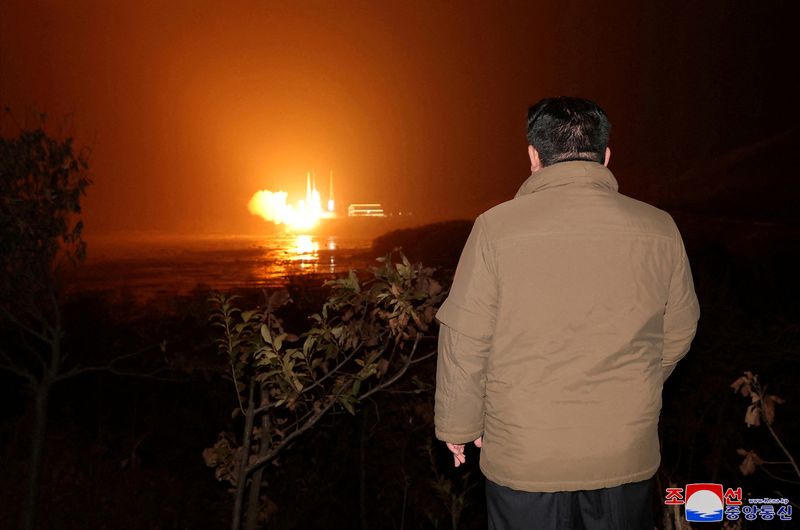By Heekyong Yang
SEOUL (Reuters) -North Korea said on Saturday it would consider any interference with its satellite operations a declaration of war and would mobilise its war deterrence if any attack against its strategic assets were imminent.
Pyongyang would respond to any U.S. interference in space by eliminating the viability of U.S. spy satellites, state media KCNA reported, citing a statement from North Korea's defence ministry spokesperson.
"In case the U.S. tries to violate the legitimate territory of a sovereign state by weaponizing the latest technologies illegally and unjustly, the DPRK will consider taking responsive action measures for self-defence to undermine or destroy the viability of the U.S. spy satellites," the statement said.
DPRK are the initials of the North's official name, the Democratic People's Republic of Korea.
North Korea says it successfully launched its first military spy satellite on Nov. 21, transmitting photos of military installations in the U.S. mainland, Japan and the U.S. territory of Guam.
A U.S. Space Command spokesman, asked if Washington had the capability to interrupt the North Korean satellite's reconnaissance operations, said the U.S. could deny an adversary's space capabilities using a variety of means, according to U.S. broadcaster RFA.
In a statement issued later on Saturday, North Korea's foreign ministry said it will take countermeasures against individuals and organisations of the U.S. and "its vassal forces" that impose and enforce sanctions against North Korea, adding that U.S. sanctions violate international law.
The United States on Thursday targeted North Korea with fresh sanctions after the launch, designating foreign-based agents it accused of facilitating sanctions evasion to gather revenue and technology for its weapons of mass destruction programme.
South Korea on Friday blacklisted 11 North Koreans for involvement in the country's satellite and ballistic missile development, banning them from financial transactions.

North Korean state media issued a commentary by a North Korean international relations analyst, who argued "the United States, the world's biggest satellite possessor," should face the United Nations Security Council if sending satellites is considered a crime.
"In case an unexpected clash happens in the Northeast Asian region around the Korean peninsula, the U.S., which has continuously put pressure on the security space of the DPRK by escalating military threat and blackmail, will be held wholly accountable for the catastrophic situation," the commentary said. It also blamed the United States for joint military exercises with Japan and South Korea, as well as for displaying its nuclear-powered aircraft carriers.